The first trace he chose to leave was the “Confessions”, the first autobiographical novel in which the adult narrator meets the main hero at different stages of his life. By sharing openly and in great detail both happy memories and more controversial aspects of his life, Rousseau also sought to justify himself. He wanted to overcome the feeling of incomprehension that had accompanied him all his life. But let’s start at the beginning, in the Geneva of yesteryear.
Grand-Rue 40, city of Calvin
Young Jean-Jacques was born on June 28, 1712 into a Protestant family of Genevan citizens. His father, Isaac Rousseau, was a watchmaker, and his mother, Suzanne Bernard, came from a watchmaking family. So far, so good in 18th-century Geneva. A few days after his birth, Jean-Jacques lost his mother and, at the age of 10, his father as well. Following a quarrel, his father was forced to flee Geneva. The young man began a life of instability and isolation on his own, first at a boarding school in Bossey, then as an apprentice to an engraver in Geneva. He, in turn, left his native city in 1782 to embark on a life of travel.
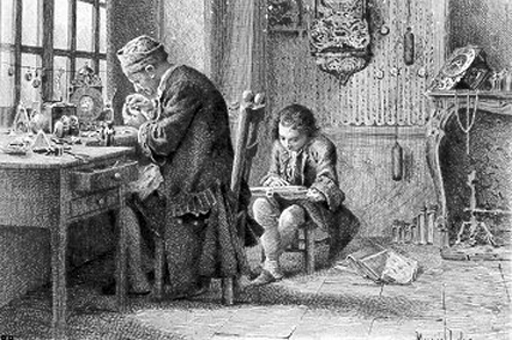
His first stop is Savoie. Although geographically not so far from Geneva, everything was different. Influenced by Françoise-Louise de Warens, his mistress at the time, he converted to Catholicism. Settling in the peaceful village of Charmettes, he devoted himself to his intellectual training, reading the Christian and philosophical writings of the time. Although his father taught him a few principles of music, Jean-Jacques was self-taught and eager to acquire knowledge in various fields. It was at this point that he set up his “idea store”. The concept? Accumulate as many ideas as you can, right or wrong, and once you’ve got enough information in your head, you can build up your own opinion of the world. But this first chapter of his life comes to an end with the arrival of Madame de Warens’ new lover. Forced to leave this haven of peace in 1742, Jean-Jacques Rousseau would remain for the rest of his life very nostalgic for this happy stay in the middle of nature with the woman he ambiguously called “maman” (mother). But Paris awaited him, and what a culture shock it was!
“I cost my mother her life, my birth was the first of my misfortunes.”
Confessions
Paris is a party in an immoral society
Paris. The opulence of the Ancien Régime, worldly soirees and the desire to shine were the hallmarks of this era… . In short, everything was at odds with the sobriety of Geneva and the omnipresent nature of Les Charmettes. But Rousseau had a clear idea in mind: to conquer the capital and make a name for himself as a music master. He presented his own system of musical notation… but it was not as successful as he had hoped. It was a failure. His first. The second followed in 1745, when his opera-ballet “Les Muses galantes” drew strong criticism from Jean-Philippe Rameau. This situation, reinforced by other controversies and events, led to the so-called “Querelle des Bouffons”, but that’s another story. That said, not everything in Rousseau’s life was negative. The year 1745 also marked his marriage to Thérèse Levasseur, a modest, almost illiterate servant who nevertheless accompanied him throughout his life, following him into exile. They had five children together. From Confessions, the public will know that they were all entrusted to the hospice des Enfants-trouvés. Although this was common practice at the time, Rousseau was strongly criticized.
“Though naturally shy, I was bold sometimes in my youth, never in my old age. The more I’ve seen of the world, the less I’ve been able to get used to its tone.”
Confessions
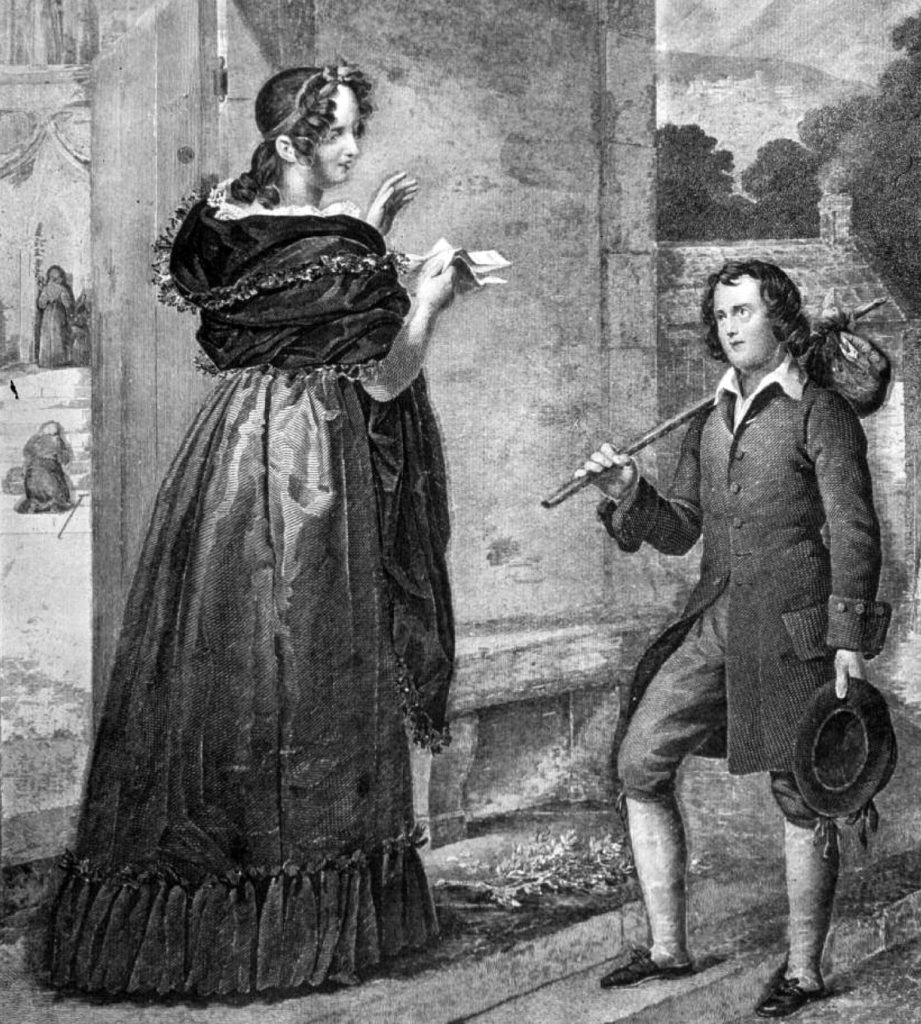
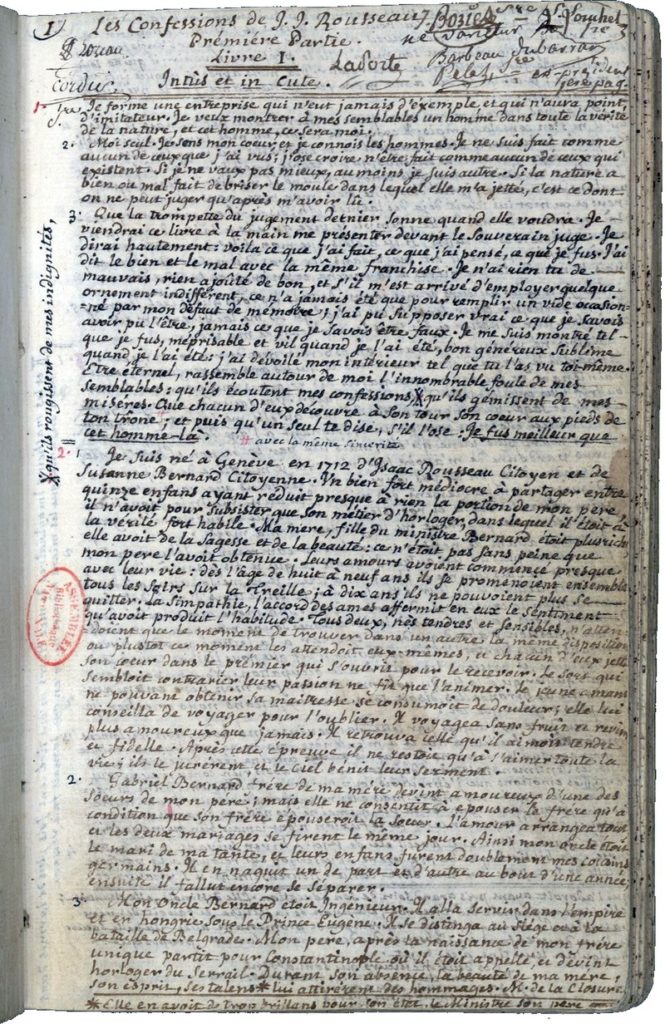
E, for Encyclopedia
It was also in Paris that Jean-Jacques Rousseau met a number of intellectuals. Their philosophical positions, approaches to society and religious faith (and yes, most of them were atheists or undecided), confronted his own ideas. Although he felt a need to express himself, he found it difficult to enter these circles, remaining a stranger to his contemporaries. Gradually, he befriended Denis Diderot, fascinated by the latter’s intelligence. The two men shared a passion for notes and chess.
Diderot was to play a key role in the rest of the story. He began by asking Rousseau to write some 200 articles on music for the Encyclopédie, then urged him to take part in the Dijon Academy competition. The subject? “Has the re-establishment of the Sciences and Arts contributed to purifying or corrupting morals?”. With his “storehouse of ideas” fairly full, 1750 marked Rousseau’s departure as a philosopher.
Going against the grain of Enlightenment thinking, he blames progress: the development of science and the arts corrupts morals and leads to the moral and political degradation of society. For him, man is born good and happy, but is progressively putrefied by progress. This clear-cut position, which establishes his philosophical and literary stance, is celebrated with the first prize, propelling the Genevan into intellectual circles! Glory! A second speech, equally at odds with the opinions of his peers, followed five years later. This time, the philosopher tackled the foundations of inequality, focusing in particular on the theme of human domination over human. According to him, human beings are good in the state of nature, and it is the organization of society that pushes them to compare themselves with others, thus developing shame and greed. These acquired feelings are then a source of conflict, as wealth – and land in particular – is not shared equitably. Finally, the writings of the man who had initially staked everything on music flourished. But even if he is recognized and admired, he remains alone.
“It’s in the countryside that we learn to love and serve humanity: we only learn to despise it in the cities.”
Confessions
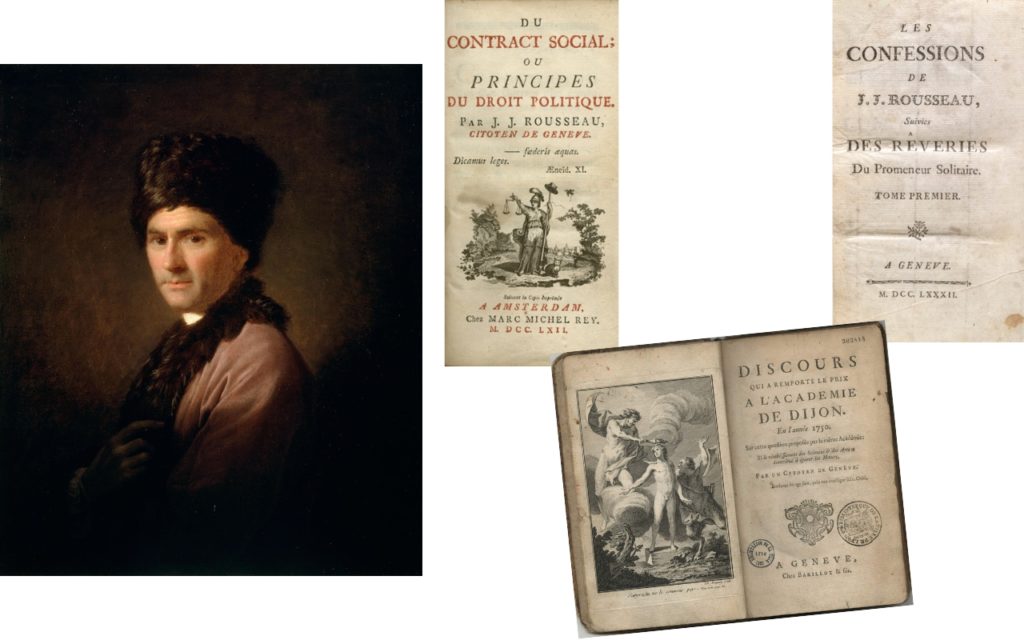
Between philosophy and literature
Finally bored with Paris, he settled in Montmorency. In this new setting and solitude, he wrote. A lot. The years 1757-1762 were undoubtedly his most productive, with the publication of Lettre à d’Alembert sur les spectacles, La nouvelle Héloïse, Émile ou De l’éducation and Du contrat social. A peaceful life on the horizon? Not really, as the Parlement de Paris condemned his latest works, sending him wandering once again. Paradoxical, given that the Social Contract was to inspire the Declaration of the Rights of Man, isn’t it? Rousseau returned to Switzerland, then England, before returning to France in 1767 under an assumed name. It was also at this time that he began his Confessions, perhaps to take stock, perhaps to justify himself, perhaps to respond to Voltaire’s accusations, perhaps a little of everything? He ended his life in Picardy in 1778. A few years later, his remains were transferred to the Pantheon as a hero of the nation.
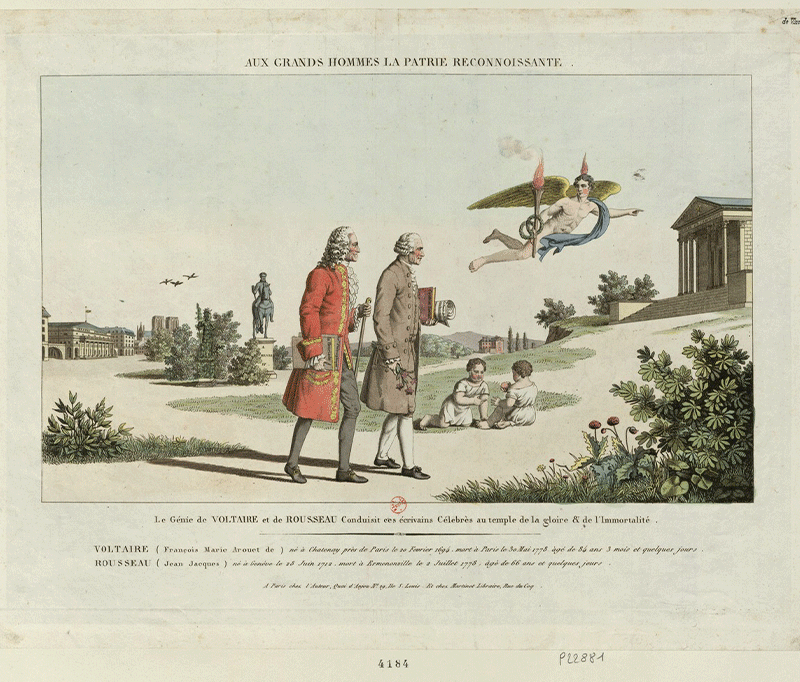
Described by Kant as the “Newton of the moral world” and admired by revolutionaries for his philosophical thoughts, Rousseau also left a literary legacy, from the beginnings of Romanticism to introspection put down on paper. His presence also permeates his hometown, whether through his statue on the eponymous island, the college on avenue du Bouchet, or the Maison Rousseau et Littérature (MRL) at 40 Grand-Rue. Although the museum is housed in the house where he was born, it does not feature any objects from his era. No, the aim is to bring to life the ideas and philosophical thinking of this “eighteenth-century influencer”, as Donatella Bernardi, the museum’s director, put it in an article in La Tribune.
